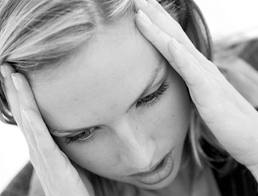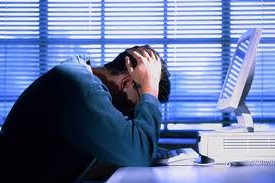The word “stress” is used in many contexts. Emotionally speaking, we can be “under stress” and we can “stress out.” Physically speaking, we can stress structures or devices to determine how they will hold up, and we can stress parts of our body to achieve strength or flexibility. In the world of mental health, stress is defined as a normal physical response to events that make you feel threatened or upset your balance in some way. Our bodies carry something called a “stress response” – meaning, we have an involuntarily defensive reaction to a stressful event. This response helps us to remain extra alert and focused, and it can produce a sudden burst of energy. One of the most common examples of a stress response would be slamming on the brakes of the car when someone suddenly cuts in front of you in order to avoid an accident. The stress response also can sharpen your concentration and keep you on your toes, enabling you to perform more productively in a particular task.
and we can “stress out.” Physically speaking, we can stress structures or devices to determine how they will hold up, and we can stress parts of our body to achieve strength or flexibility. In the world of mental health, stress is defined as a normal physical response to events that make you feel threatened or upset your balance in some way. Our bodies carry something called a “stress response” – meaning, we have an involuntarily defensive reaction to a stressful event. This response helps us to remain extra alert and focused, and it can produce a sudden burst of energy. One of the most common examples of a stress response would be slamming on the brakes of the car when someone suddenly cuts in front of you in order to avoid an accident. The stress response also can sharpen your concentration and keep you on your toes, enabling you to perform more productively in a particular task.
Certain kinds of stress can indeed be healthy. But when the reaction goes beyond the types of responses discussed above, not only can it be debilitating, but it can be dangerous. If your stress response is turned on too much of the time, and certainly ALL the time, it will almost always lead to serious issues – both psychological and physiological. This 2-part article will define the negative impact which stress has on us, and will offer tools to help combat stress getting the better of us.
It may be surprising to know, but according to Stress Researcher Dr. Kenneth Pelletier (Sound Mind, Sound Body – A New Model for Lifelong Health; Fireside Books; 1995), an astonishing 80-90% of all illness is stress-related. His claim is that nearly 100 million Americans suffer from illness directly related to stress. Among the physical symptoms you may experience from stress are pain of any kind, heart disease, digestive disorders, sleep disorders, depression, obesity, autoimmune diseases and skin conditions such as eczema.
 Our bodies contain a stress hormone, called cortisol. Small increases in cortisol secretion usually have a positive effect on us, enhancing our memory, immune systems and helping to produce a greater threshold for pain. Conversely, when we secrete too much cortisol, it impairs our cognitive functions, causes blood sugar imbalances, muscle loss and fat gain, higher blood pressure and lower immunity.
Our bodies contain a stress hormone, called cortisol. Small increases in cortisol secretion usually have a positive effect on us, enhancing our memory, immune systems and helping to produce a greater threshold for pain. Conversely, when we secrete too much cortisol, it impairs our cognitive functions, causes blood sugar imbalances, muscle loss and fat gain, higher blood pressure and lower immunity.
It is of paramount importance that we learn to control our stresses rather than allowing our stresses to control us. Learning and implementing stress-reduction techniques will help prevent these larger secretions of cortisol, as well as the need to deal with the resulting problems. Smoking, alcohol consumption, drug use, and staring at a monitor for hours on end are obviously are not effective ways to manage stress, but learning how to say no, avoiding stressful situations and subjects that upset you whenever possible, and keeping our “to-do” lists within manageable limits are all good starters.
The following are some Stress Management tips from Don R. Powell, Ph.D. of the American Institute for Preventive Medicine.
- Maintain a regular program of healthy eating, good health habits and adequate sleep.
- Exercise regularly. This promotes physical fitness as well as emotional well-being.
- Balance work and play. All work and no play can make you feel stressed. Plan some time for hobbies and recreation. These activities relax your mind and are a good respite from life’s worries.
- Help others. We concentrate on ourselves when we’re distressed. Sometimes helping others is the perfect remedy for whatever is troubling us.
- Take a warm shower or bath. This will soothe and calm your nerves, and relax your muscles.
- Have a good cry. Tears of sadness, joy or grief can help cleanse the body of substances that accumulate under stress, and will also release a natural pain-relieving substance from the brain.
- Laugh a lot. When events seem too overwhelming, keep a sense of humor. Laughter makes our muscles go limp and releases tension. It’s difficult to feel stress in the middle of a belly laugh. Learn to laugh as a relaxation technique.
- Learn acceptance. Sometimes a difficult problem is out of your control. When this happens, accept it until changes can be made. This is better than worrying and getting nowhere.
Stay tuned for Part 2…. More tips to reduce help you reduce your stress, and to discover a happier and healthier you! For more information on programs and events, or content related to health, family, and community please visit: OU Community Services.
Alan Freishtat is an A.C.E. CERTIFIED PERSONAL TRAINER and a BEHAVIORAL CHANGE and WELLNESS COACH with over 19 years of professional experience. Alan is the creator and director of the “10 Weeks to Health” program for weight loss. He is available for private coaching sessions, consultations, assessments and personalized workout programs both in his office and by telephone and skype. Alan also lectures and gives seminars and workshops. He can be reached at02-651-8502 or 050-555-7175, or by email atalan@alanfitness.com Check out the his web site –www.alanfitness.com US Line: 516-568-5027
The words of this author reflect his/her own opinions and do not necessarily represent the official position of the Orthodox Union.


